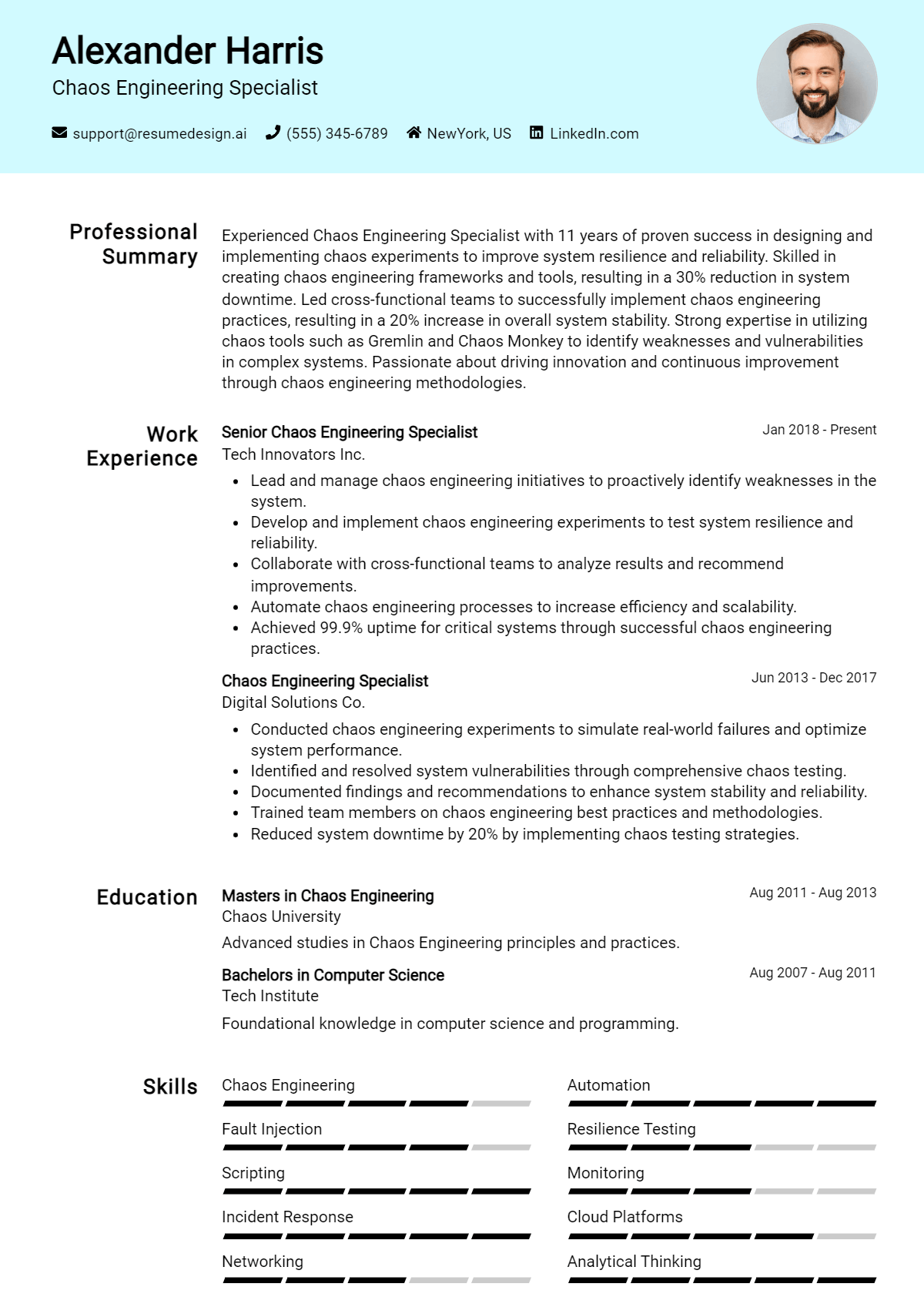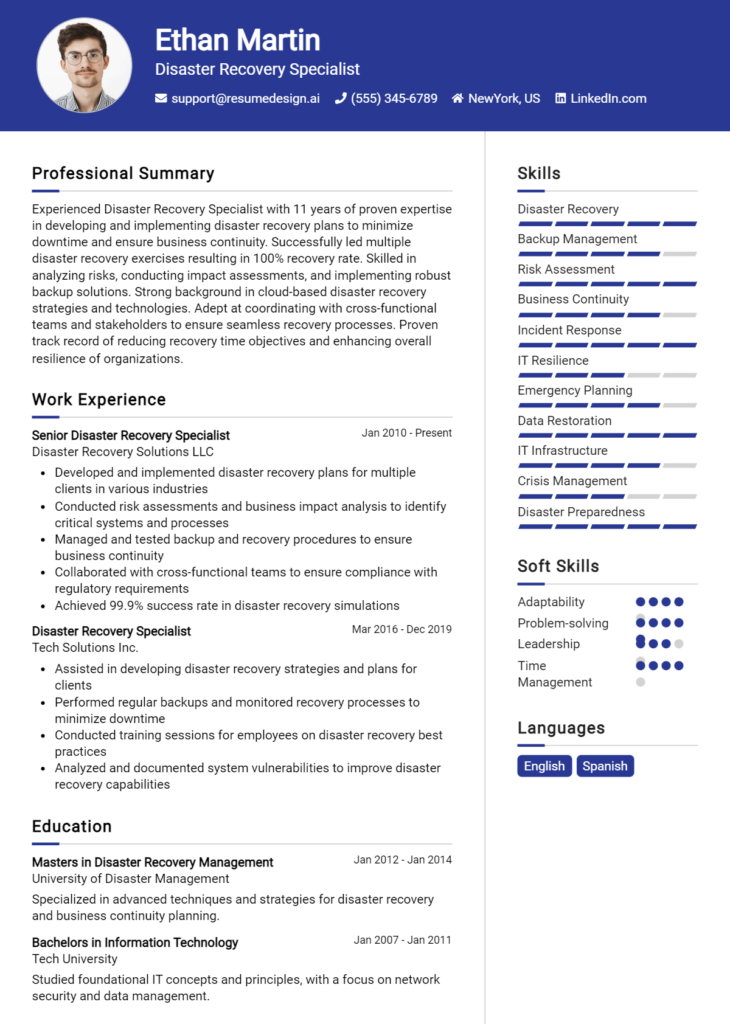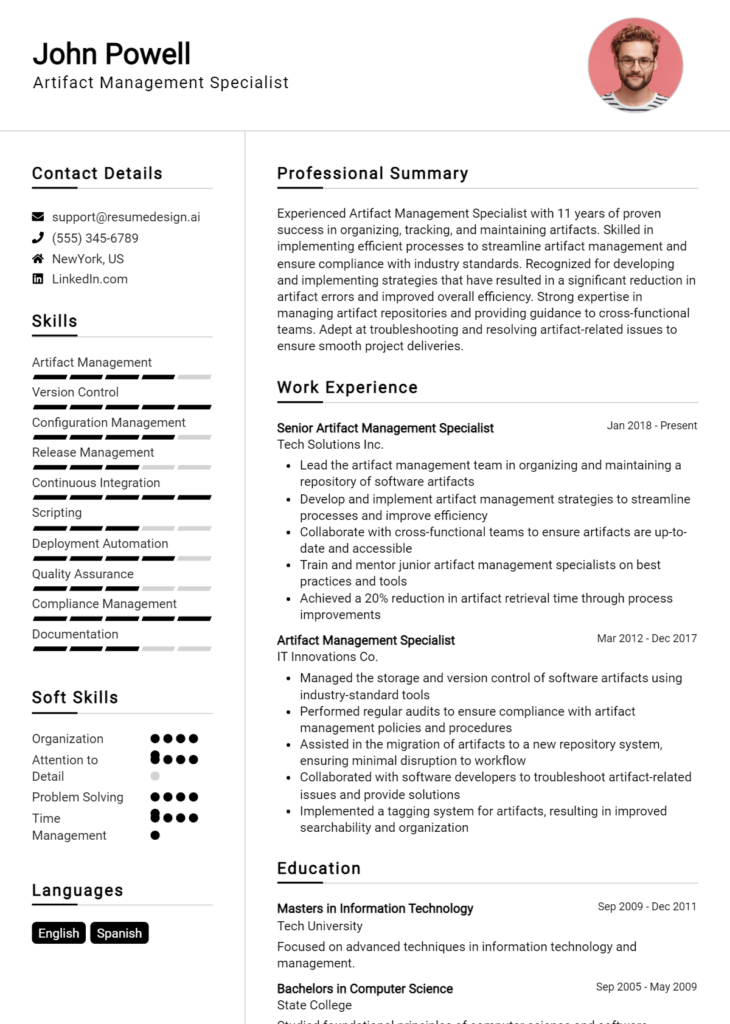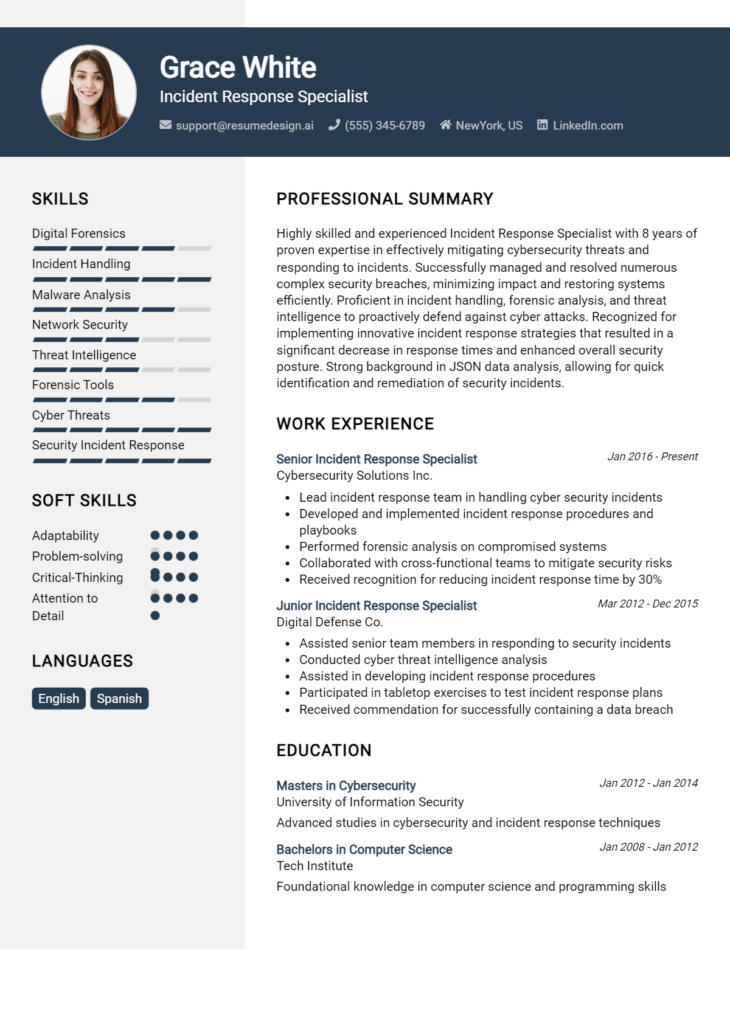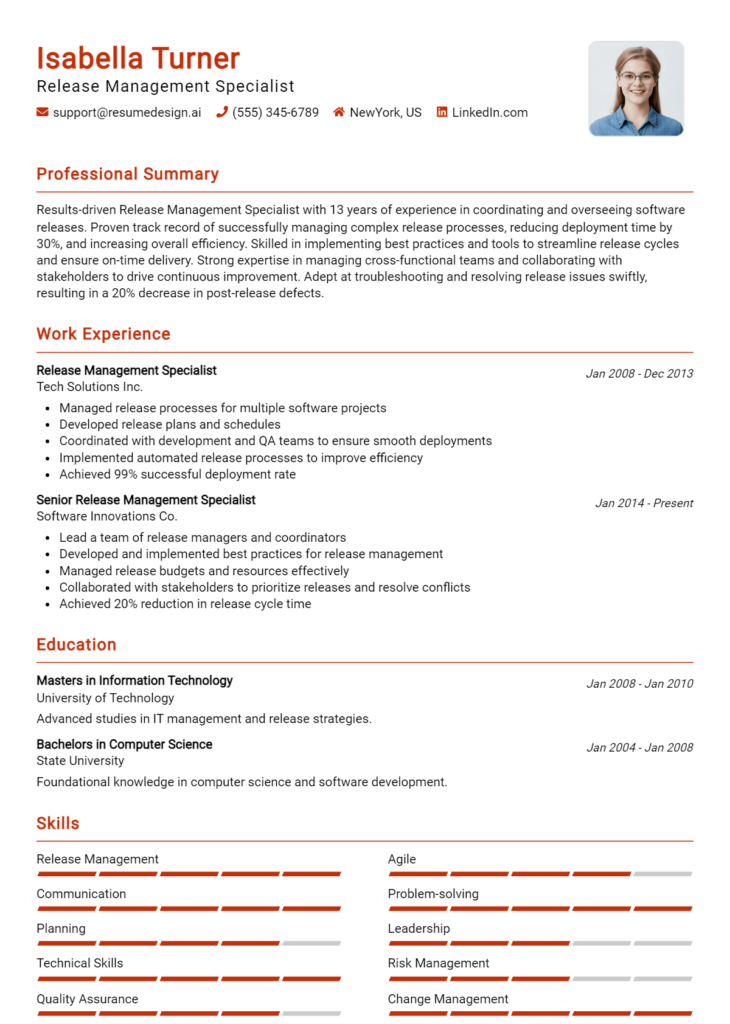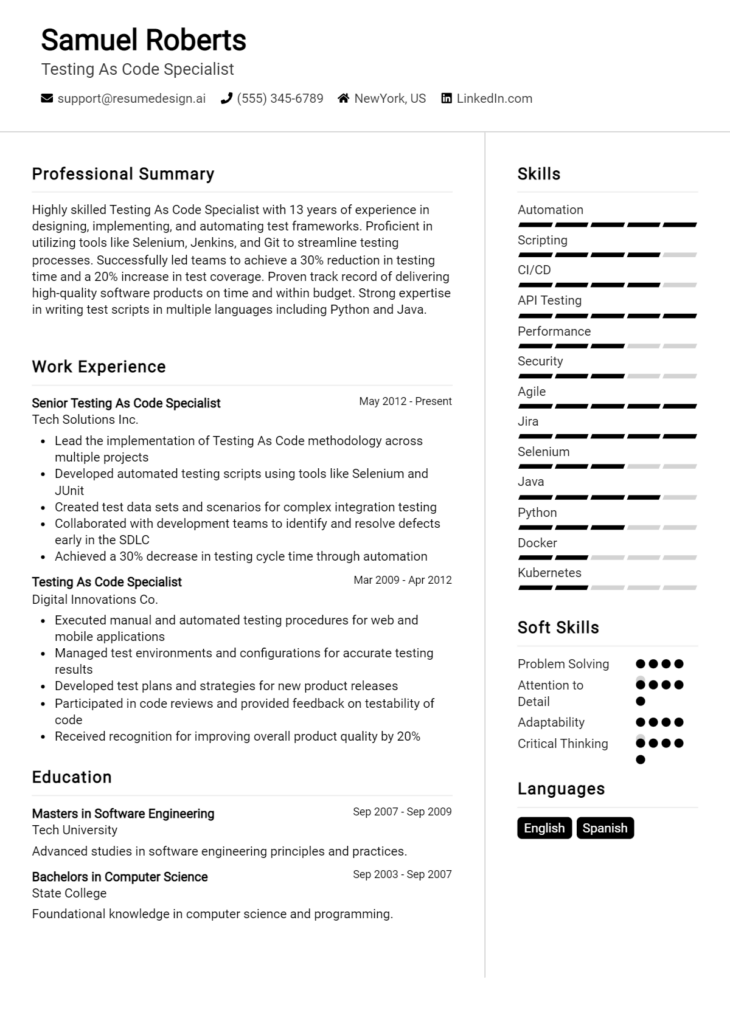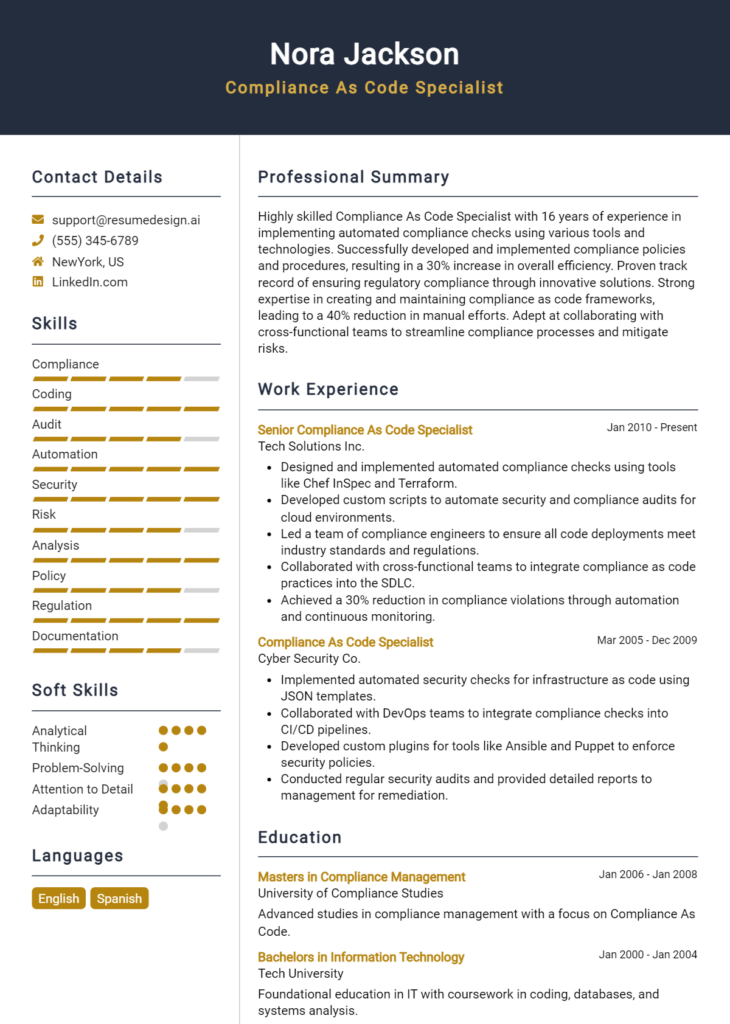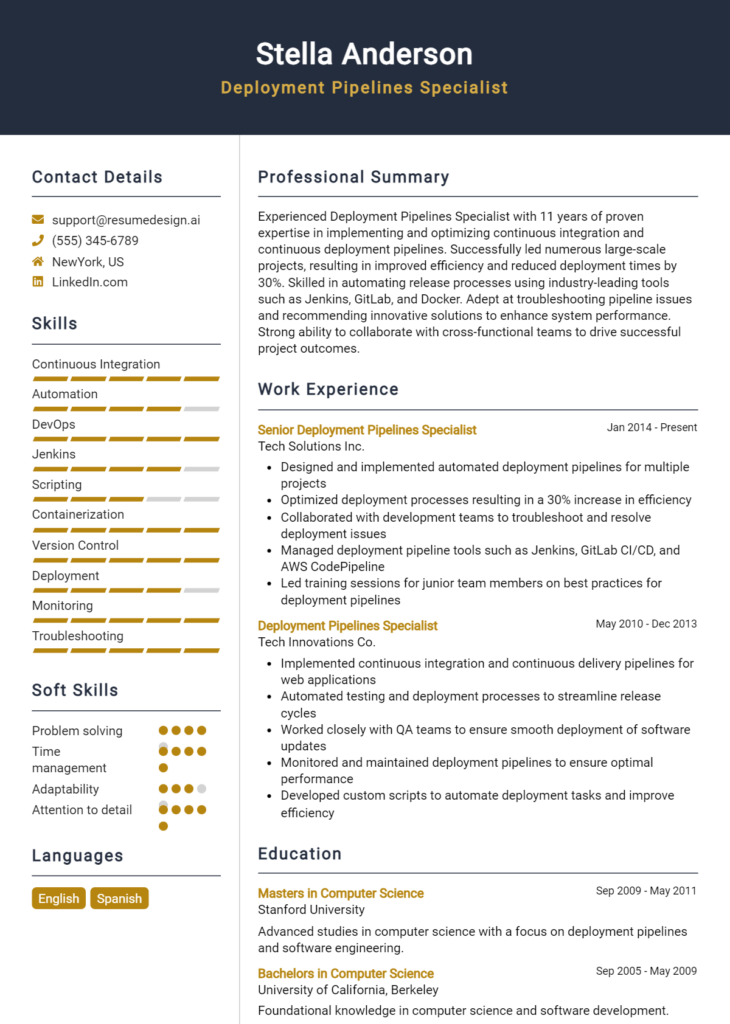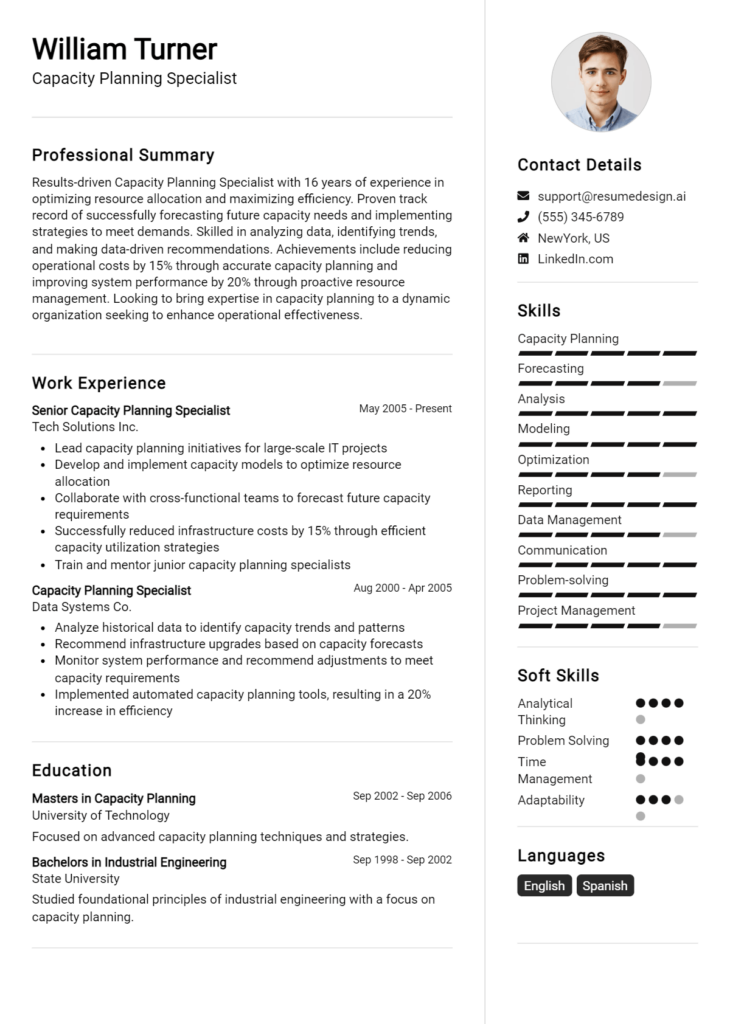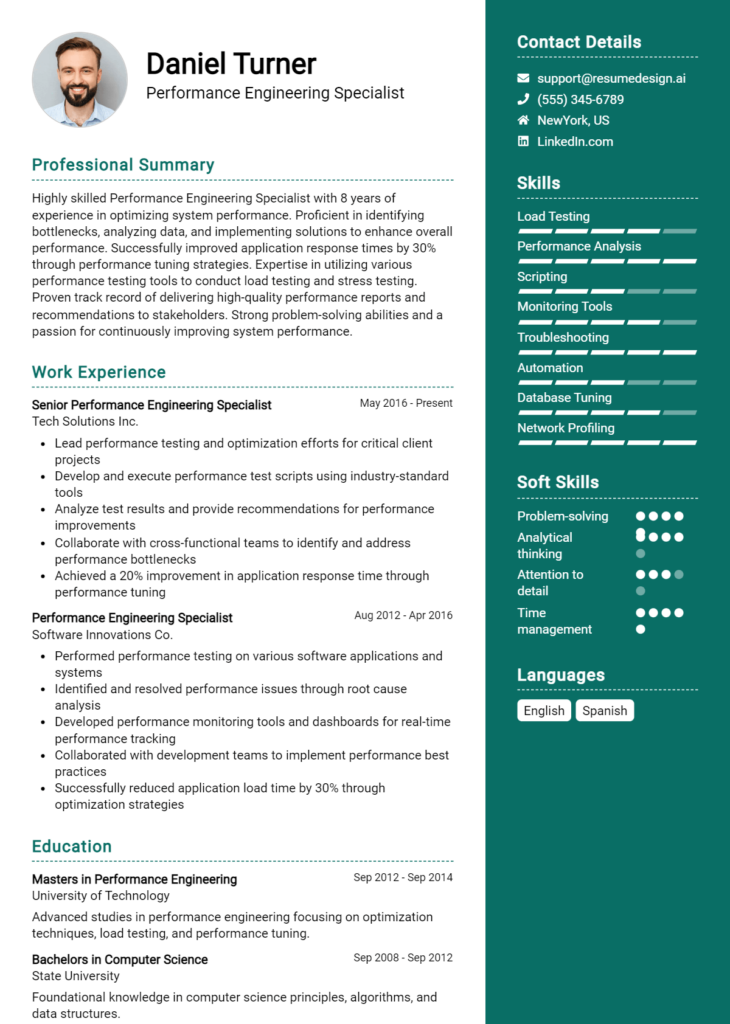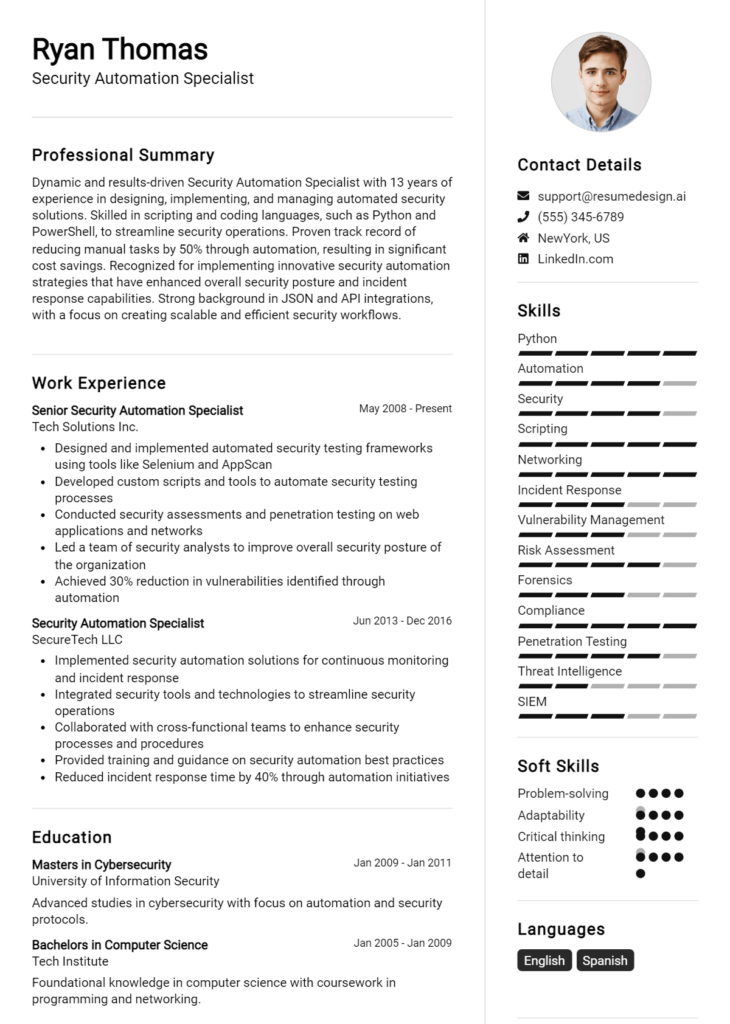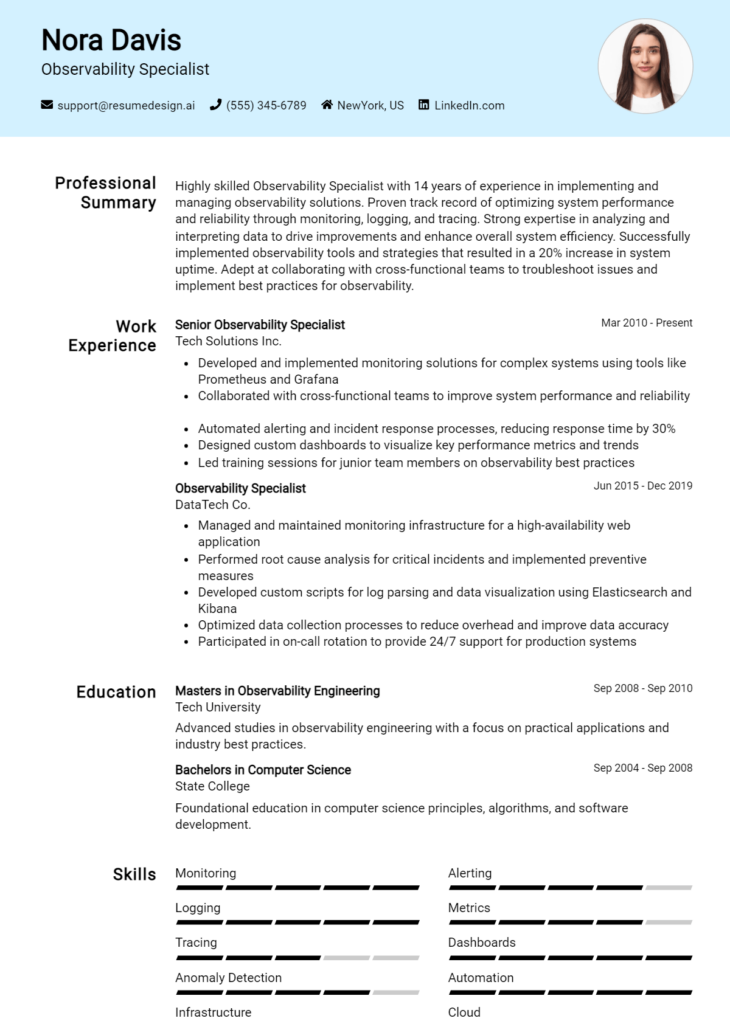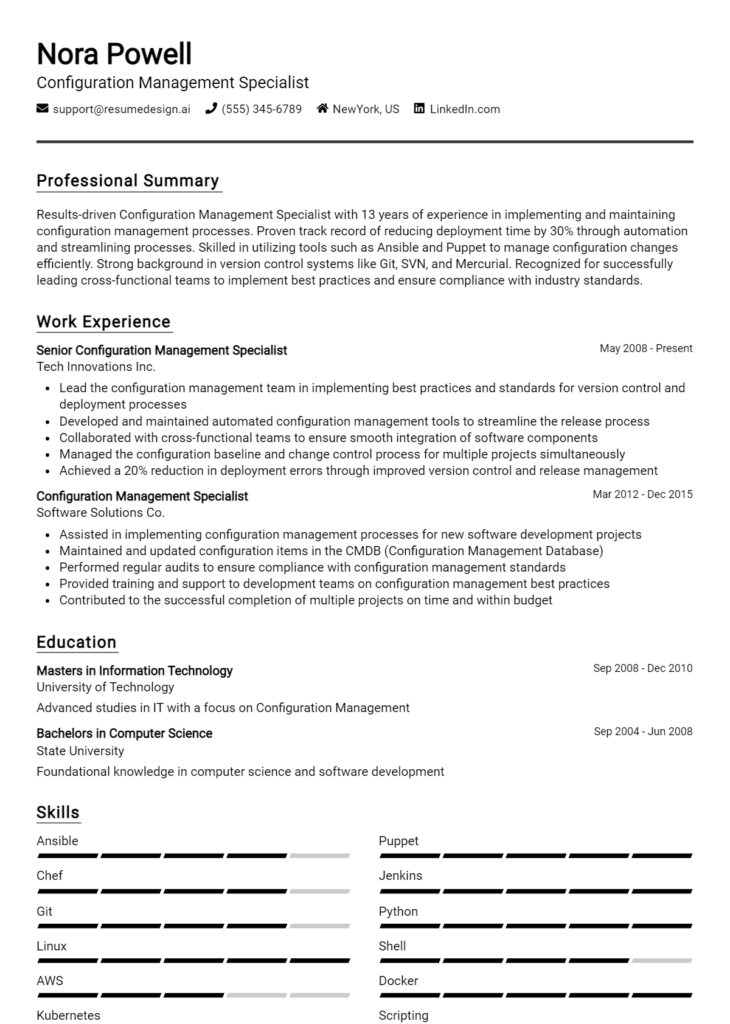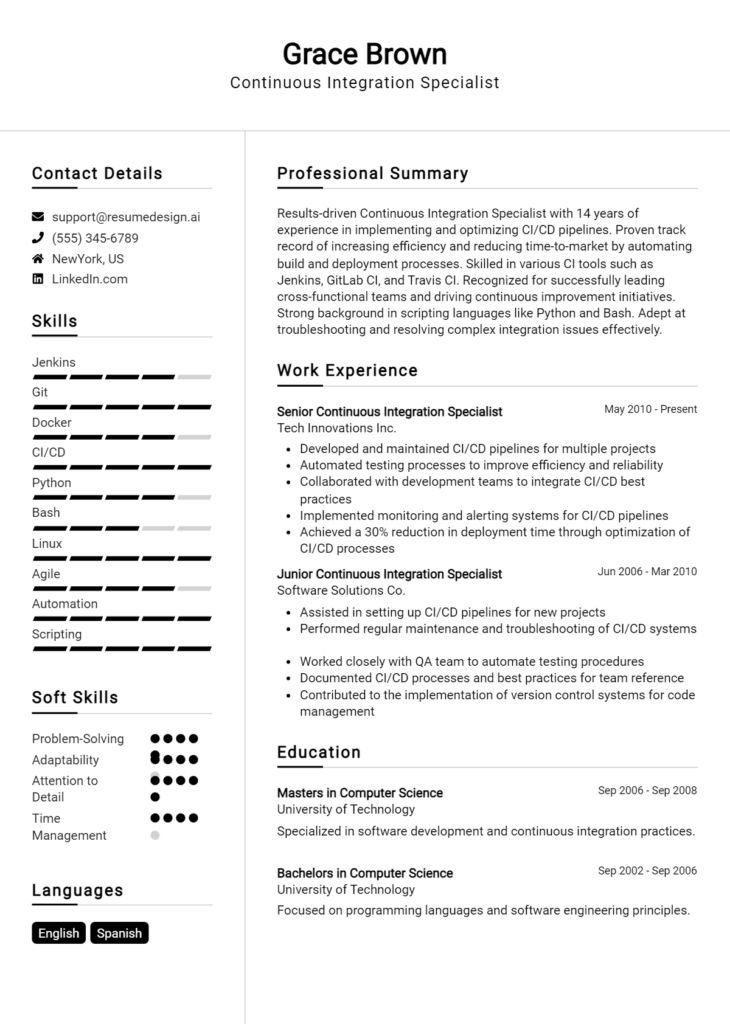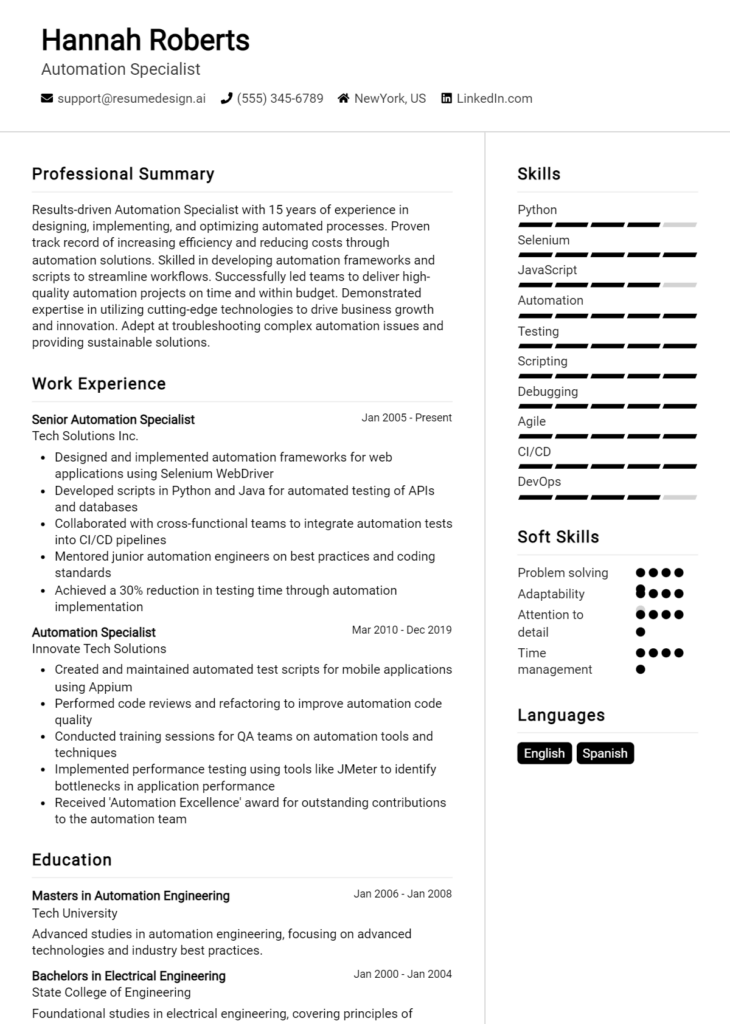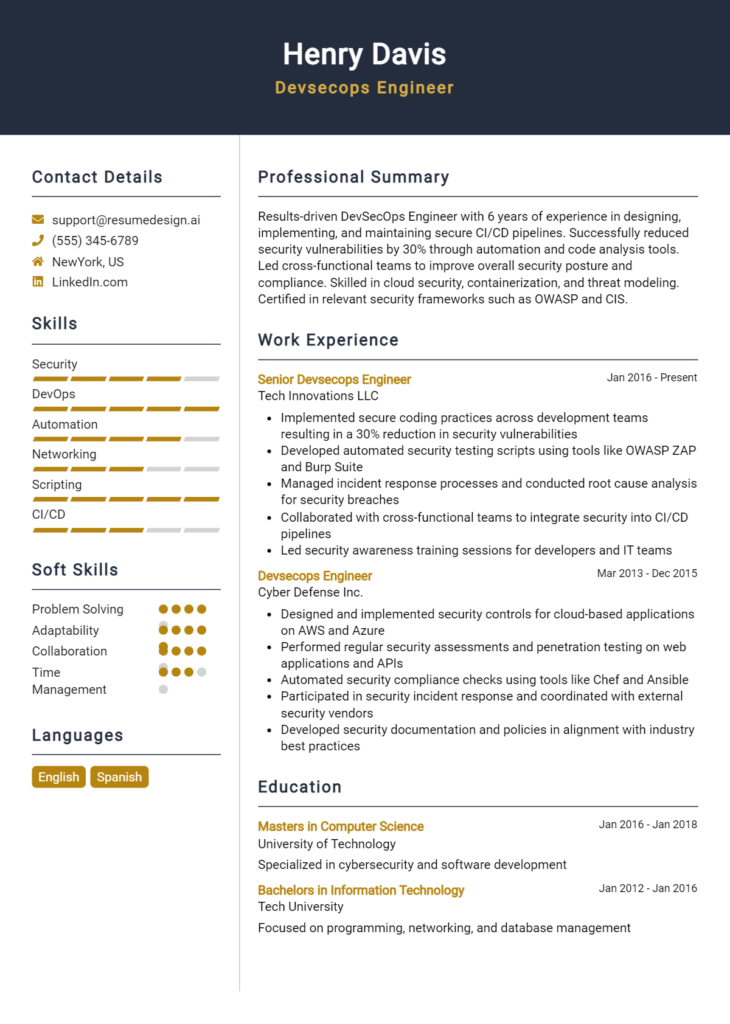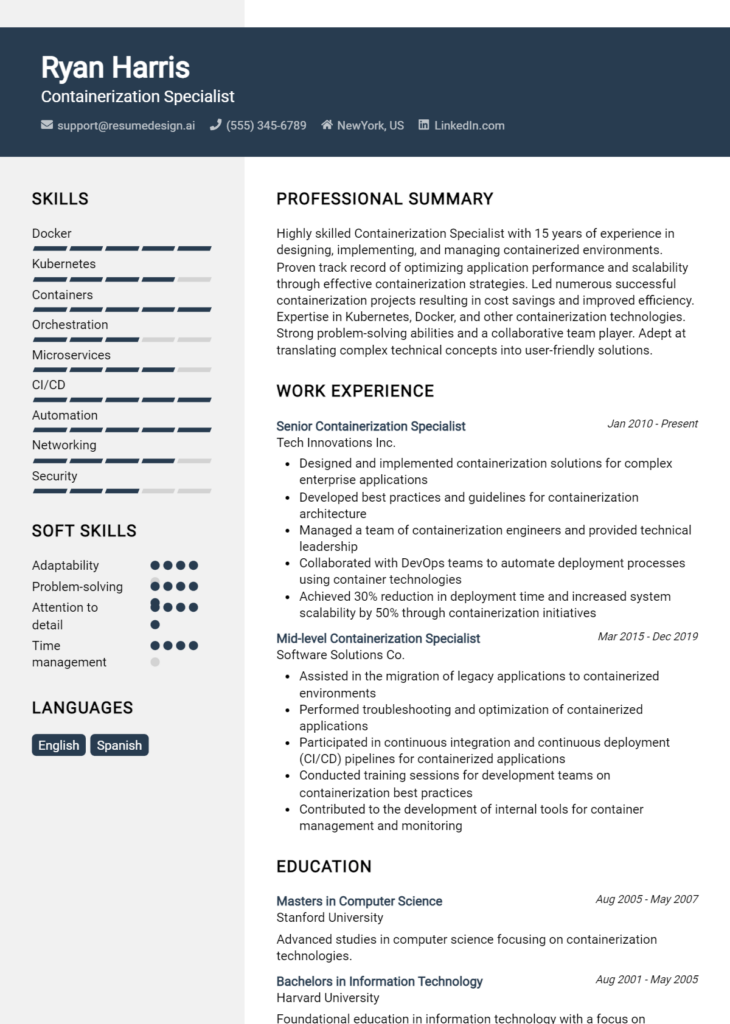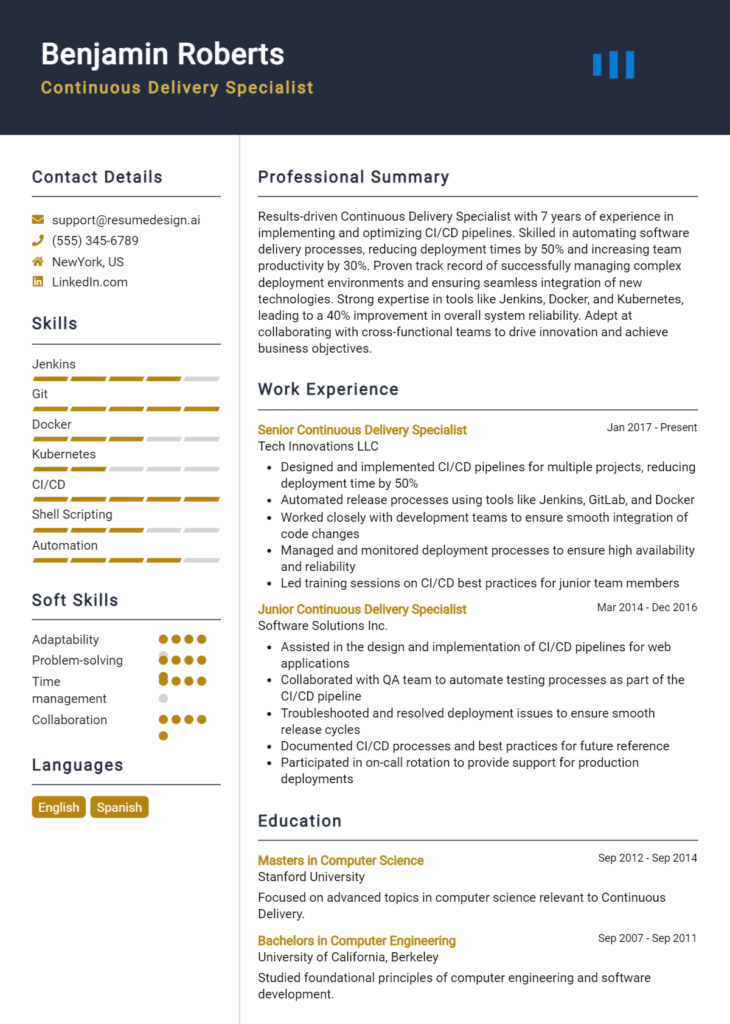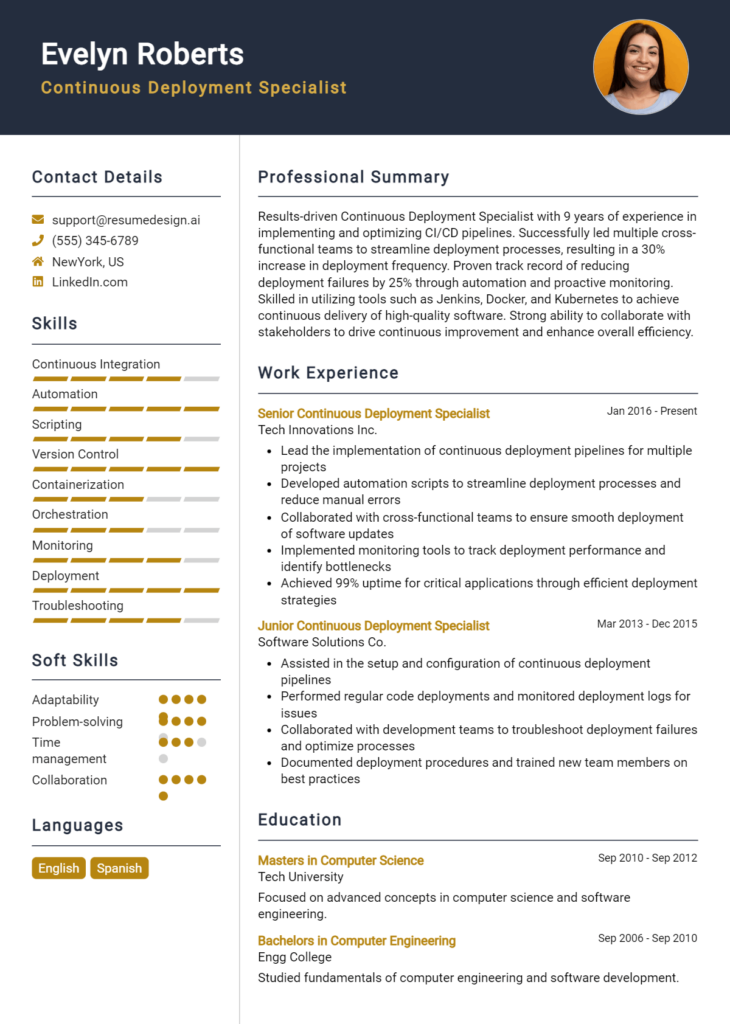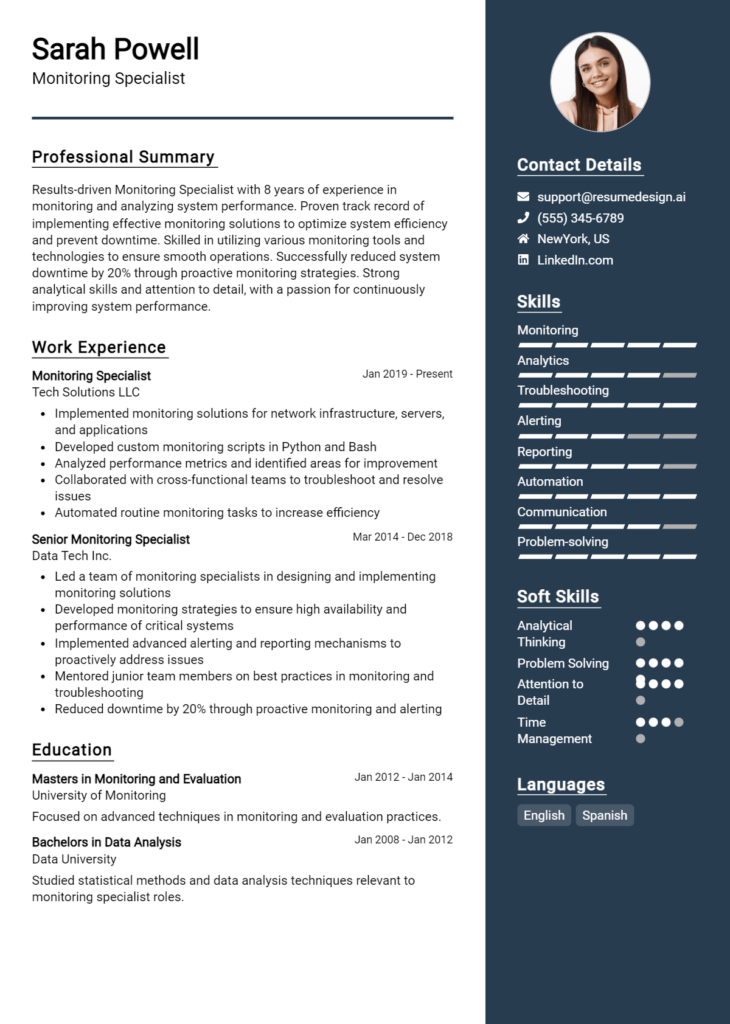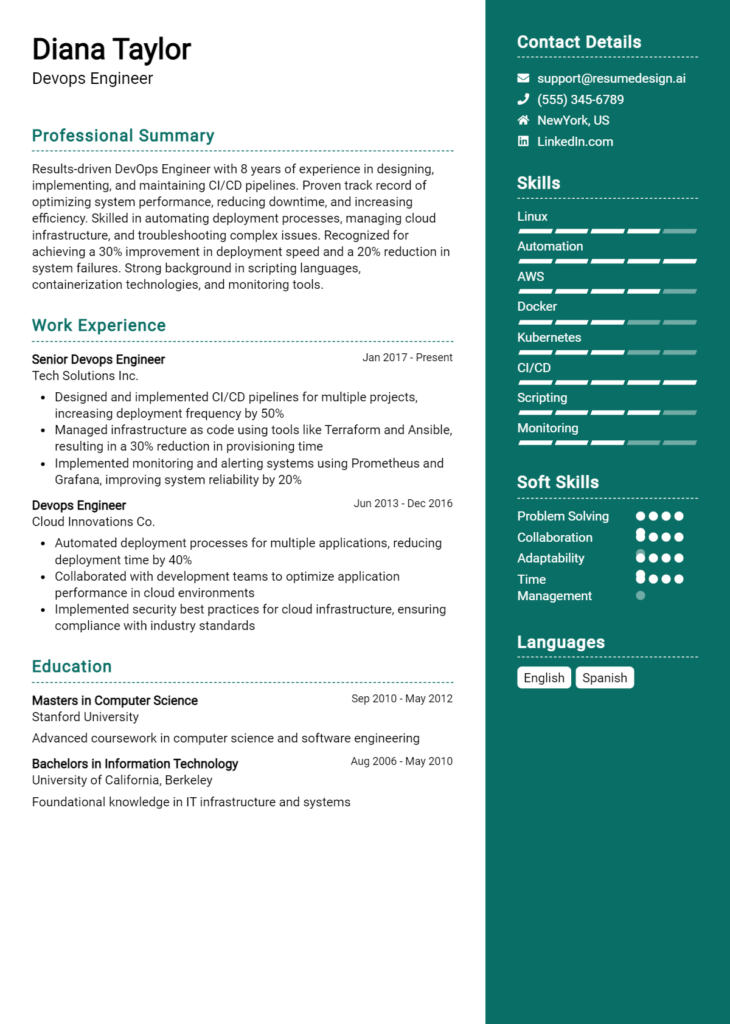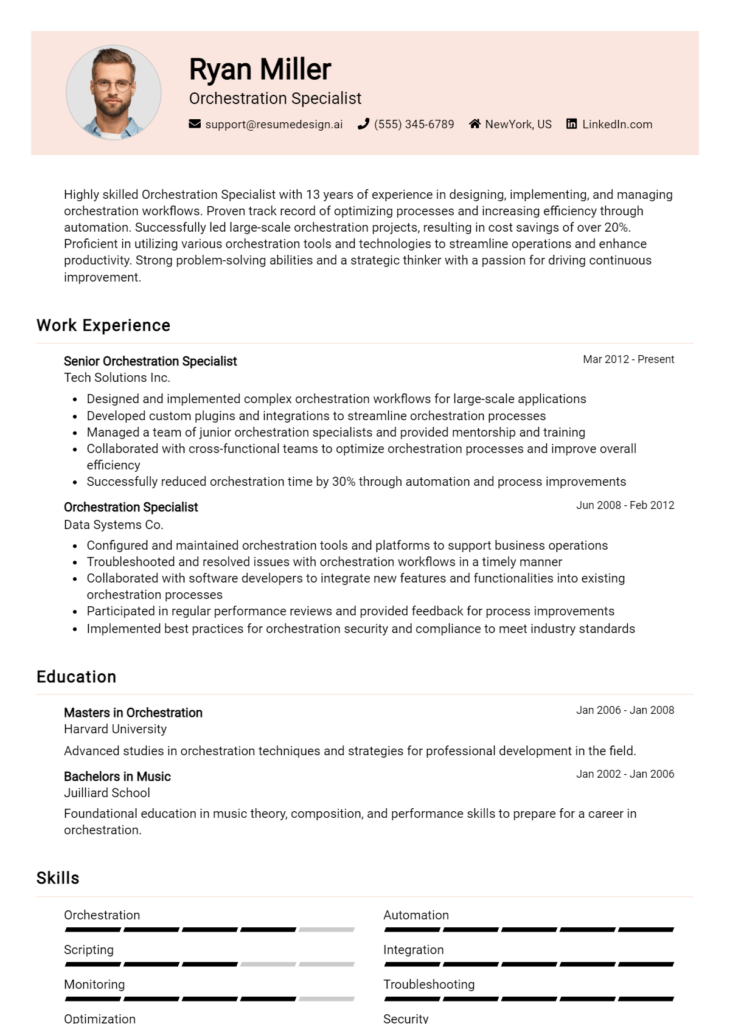Chaos Engineering Specialist Core Responsibilities
A Chaos Engineering Specialist is pivotal in ensuring system resilience and reliability across various departments, including development, operations, and security. Key responsibilities include designing and executing chaos experiments, analyzing system behaviors under stress, and collaborating with cross-functional teams to enhance incident response strategies. Essential skills encompass technical proficiency in cloud infrastructure, operational insights, and strong problem-solving abilities. These competencies drive improvements in system stability, ultimately aligning with organizational goals. A well-structured resume highlighting these qualifications can significantly enhance job prospects in this dynamic field.
Common Responsibilities Listed on Chaos Engineering Specialist Resume
- Design and implement chaos experiments to identify system vulnerabilities.
- Analyze system performance and reliability metrics post-experimentation.
- Collaborate with engineering teams to integrate chaos testing into CI/CD pipelines.
- Develop and maintain chaos engineering frameworks and tools.
- Facilitate workshops and training sessions on chaos engineering principles.
- Monitor system behavior during chaos experiments to ensure safety.
- Document findings and provide actionable insights for system improvements.
- Work with incident response teams to enhance resilience strategies.
- Continuously evaluate and refine chaos engineering practices.
- Stay updated on industry trends and emerging chaos engineering tools.
- Identify potential risks and develop mitigation strategies.
High-Level Resume Tips for Chaos Engineering Specialist Professionals
In the competitive landscape of technology, a well-crafted resume is crucial for Chaos Engineering Specialist professionals looking to make a stellar first impression on potential employers. As the initial point of contact between a candidate and an organization, the resume serves not only as a summary of skills and experiences but also as a reflection of the candidate's ability to communicate effectively and align with the company's needs. For Chaos Engineering roles, where the ability to navigate complex systems and ensure resilience is key, showcasing both technical capabilities and notable achievements is essential. This guide will provide practical and actionable resume tips specifically tailored for Chaos Engineering Specialist professionals, helping you stand out in a crowded job market.
Top Resume Tips for Chaos Engineering Specialist Professionals
- Tailor your resume to match the job description, emphasizing the skills and experiences that align with the specific requirements of the position.
- Highlight relevant experience in chaos engineering, including specific tools and methodologies you have employed.
- Quantify your achievements by using metrics and data to demonstrate the impact of your contributions, such as system uptime, incident reduction, or performance improvements.
- Showcase industry-specific skills like knowledge of cloud platforms, automation tools, and chaos testing frameworks.
- Include certifications or training relevant to chaos engineering and systems reliability, which can set you apart from other candidates.
- Utilize action verbs and concise language to convey your responsibilities and accomplishments clearly and effectively.
- Incorporate keywords from the job description to improve your resume's visibility in applicant tracking systems.
- Maintain a clean and organized format, using bullet points and headings to make your resume easy to read and navigate.
- Consider including a summary statement at the top that encapsulates your expertise and value proposition as a Chaos Engineering Specialist.
By implementing these tips, you can significantly increase your chances of landing a job in the Chaos Engineering Specialist field. A polished resume not only showcases your qualifications but also conveys your professional approach and commitment to excellence, making you a compelling candidate for potential employers.
Why Resume Headlines & Titles are Important for Chaos Engineering Specialist
In the competitive field of chaos engineering, a well-crafted resume headline or title serves as a critical first impression for a Chaos Engineering Specialist. This succinct phrase encapsulates the candidate's key qualifications and expertise, immediately grabbing the attention of hiring managers who often skim through numerous resumes. A strong headline is not only concise and relevant but also directly aligned with the job being applied for, allowing candidates to stand out in a crowded applicant pool. By summarizing their unique strengths in a compelling way, candidates can effectively communicate their value and relevance to potential employers.
Best Practices for Crafting Resume Headlines for Chaos Engineering Specialist
- Keep it concise: Aim for one impactful sentence that captures your essence.
- Be specific: Use industry-related terms that highlight your chaos engineering skills.
- Showcase accomplishments: Include quantifiable achievements to demonstrate your impact.
- Align with the job description: Tailor your headline to reflect the specific role you are applying for.
- Use strong action words: Start with verbs that convey confidence and capability.
- Focus on key skills: Highlight the most relevant technical skills and tools you possess.
- Avoid clichés: Steer clear of generic phrases that don’t add value or specificity.
- Make it engaging: Use language that piques interest and invites further reading.
Example Resume Headlines for Chaos Engineering Specialist
Strong Resume Headlines
Innovative Chaos Engineering Specialist with 5+ Years Driving Resilience in Complex Systems
Results-Driven Chaos Engineer Specializing in Automated Testing and Incident Response
Expert in Chaos Engineering and Site Reliability with Proven Track Record of Reducing Downtime by 40%
Weak Resume Headlines
Seeking Job in IT
Experienced Engineer
Strong headlines are effective because they immediately convey the candidate’s relevant expertise and achievements in a way that aligns with the needs of the hiring manager. They are specific, engaging, and tailored, making it easy for employers to see the value the candidate brings to the table. In contrast, weak headlines fail to impress because they are vague and overly generic, offering little insight into the candidate’s qualifications or suitability for the chaos engineering role. Such titles miss the opportunity to make a memorable impact, leading to a lack of interest from potential employers.
Writing an Exceptional Chaos Engineering Specialist Resume Summary
A well-crafted resume summary is essential for a Chaos Engineering Specialist as it serves as a snapshot of the candidate's qualifications, skills, and achievements. This brief yet impactful section quickly captures the attention of hiring managers, offering them a compelling reason to delve deeper into the resume. A strong summary should encapsulate the candidate's relevant experience in chaos engineering, their technical proficiencies, and any notable accomplishments that align with the job requirements. By being concise and tailored to the specific role, the summary creates a powerful first impression, setting the stage for a successful job application.
Best Practices for Writing a Chaos Engineering Specialist Resume Summary
- Quantify achievements wherever possible to demonstrate impact.
- Focus on key skills relevant to chaos engineering, such as resilience testing and incident management.
- Tailor the summary based on the specific job description to highlight relevant experience.
- Use action verbs to convey a sense of proactivity and effectiveness.
- Keep it concise, ideally within 3-5 sentences.
- Incorporate industry-specific jargon to showcase expertise and familiarity with chaos engineering concepts.
- Highlight collaborative experience, especially in cross-functional teams, to show adaptability.
- Emphasize continuous learning and any certifications relevant to chaos engineering practices.
Example Chaos Engineering Specialist Resume Summaries
Strong Resume Summaries
Results-driven Chaos Engineering Specialist with over 5 years of experience in implementing chaos experiments that improved system reliability by 30%. Proficient in developing automated testing frameworks and utilizing observability tools to ensure high availability across production environments.
Dynamic Chaos Engineering Specialist with a proven track record of reducing incident response times by 25%. Expertise in resilience testing and the development of chaos experiments that have successfully mitigated risks in microservices architectures.
Detail-oriented Chaos Engineering Specialist with extensive experience in conducting chaos simulations and stress tests, leading to a 40% decrease in production outages. Skilled in collaborating with DevOps teams to integrate chaos engineering practices into CI/CD pipelines.
Weak Resume Summaries
Experienced IT professional with a background in chaos engineering and systems management.
Skilled in various technologies and methodologies related to engineering and system stability.
The strong resume summaries stand out because they provide specific, quantifiable results and highlight relevant skills directly related to chaos engineering. They convey a clear understanding of the role and showcase the candidate's ability to deliver measurable improvements in system reliability and performance. In contrast, the weak summaries lack detail and specificity, making them too vague and generic to effectively demonstrate the candidate's qualifications or impact in the field of chaos engineering.
Work Experience Section for Chaos Engineering Specialist Resume
The work experience section of a Chaos Engineering Specialist resume is essential as it provides a comprehensive overview of the candidate's relevant background in the field. This section highlights not only the technical skills acquired through various roles but also the ability to lead teams in high-stakes environments where reliability is paramount. By quantifying achievements and aligning experiences with industry standards, candidates can demonstrate their impact on product quality and system resilience, making their application stand out in a competitive job market.
Best Practices for Chaos Engineering Specialist Work Experience
- Highlight specific tools and technologies used in chaos engineering practices.
- Quantify achievements with metrics that demonstrate the impact of chaos testing on system performance.
- Showcase collaborative projects that involved cross-functional teams to enhance system reliability.
- Detail leadership roles taken in chaos engineering initiatives, such as mentoring or guiding teams.
- Align experiences with industry standards and best practices in chaos engineering methodologies.
- Include examples of risk management and incident response improvements resulting from chaos engineering efforts.
- Demonstrate continuous learning through certifications or training relevant to chaos engineering.
- Provide context for challenges faced and solutions implemented during chaos experiments.
Example Work Experiences for Chaos Engineering Specialist
Strong Experiences
- Led a team of 5 engineers to implement chaos testing frameworks, resulting in a 40% reduction in system downtime during peak traffic periods.
- Developed and executed a chaos engineering strategy that improved application performance by 30%, directly contributing to a 15% increase in customer satisfaction scores.
- Collaborated with product and development teams to integrate chaos science into the CI/CD pipeline, which decreased deployment failures by 25%.
- Conducted over 20 chaos experiments that identified critical vulnerabilities, leading to a comprehensive risk mitigation strategy that reduced incident response time by 50%.
Weak Experiences
- Assisted in some chaos testing activities without clear outcomes or metrics.
- Participated in team meetings related to chaos engineering, but did not take on any specific responsibilities.
- Worked on improving system reliability but lacked concrete examples of what was achieved.
- Engaged in general troubleshooting tasks that were not directly related to chaos engineering initiatives.
The examples of strong experiences are considered impactful because they clearly quantify achievements and demonstrate the candidate's leadership and collaboration in chaos engineering initiatives, providing tangible outcomes that align with industry standards. In contrast, the weak experiences lack specificity, measurable results, and do not convey active contributions to chaos engineering efforts, making them less compelling to potential employers.
Education and Certifications Section for Chaos Engineering Specialist Resume
The education and certifications section of a Chaos Engineering Specialist resume is crucial for establishing the candidate's academic qualifications and commitment to continuous professional development. In the rapidly evolving field of chaos engineering, showcasing relevant educational background and industry-recognized certifications can significantly enhance a candidate’s credibility. This section demonstrates not only foundational knowledge but also specialized training that aligns with the demands of the role. By including pertinent coursework and certifications, candidates can effectively highlight their preparedness for the challenges of chaos engineering, setting themselves apart from others in the field.
Best Practices for Chaos Engineering Specialist Education and Certifications
- Focus on relevant degrees in computer science, software engineering, or related fields.
- Include industry-recognized certifications, such as Certified Kubernetes Administrator (CKA) or AWS Certified DevOps Engineer.
- Highlight specialized training in chaos engineering tools and methodologies, such as Gremlin or Chaos Monkey.
- Provide details about relevant coursework or projects that demonstrate hands-on experience with chaos testing.
- Keep the section concise but informative, avoiding unnecessary details about unrelated degrees.
- Showcase any participation in workshops or conferences related to chaos engineering or resilience practices.
- Use clear and standard formatting to enhance readability and professionalism.
- Update the section regularly to reflect new certifications or educational advancements.
Example Education and Certifications for Chaos Engineering Specialist
Strong Examples
- M.S. in Computer Science, Stanford University - Focus on Distributed Systems and Resilience Engineering.
- Certified Kubernetes Administrator (CKA) - Demonstrates cloud-native application management skills.
- Chaos Engineering Fundamentals Course - Completed through Gremlin Academy.
- B.S. in Software Engineering, University of California, Berkeley - Relevant coursework in cloud architecture and systems reliability.
Weak Examples
- B.A. in History - No relevance to technology or chaos engineering.
- Certification in Microsoft Office Suite - Not applicable to chaos engineering practices.
- Outdated CompTIA A+ Certification - Lacks relevance to advanced chaos engineering roles.
- High School Diploma - Insufficient educational background for a specialized technical role.
The strong examples are considered effective because they directly relate to the skills and knowledge necessary for a Chaos Engineering Specialist role, showcasing advanced degrees and industry-recognized certifications. They highlight a commitment to specialized training and relevant coursework, enhancing the candidate's profile. Conversely, the weak examples illustrate a lack of relevance to the position, featuring outdated or unrelated qualifications that do not contribute to the candidate’s credibility in the field of chaos engineering.
Top Skills & Keywords for Chaos Engineering Specialist Resume
As the field of technology continues to evolve, the role of a Chaos Engineering Specialist has become increasingly vital in ensuring system resilience and reliability. A well-crafted resume that highlights the right skills can significantly enhance a candidate's prospects in this competitive job market. Skills not only demonstrate a candidate’s ability to handle complex systems and mitigate risks but also reflect their problem-solving capabilities and innovative mindset. Therefore, it is essential for aspiring Chaos Engineering Specialists to carefully curate their resumes, showcasing both their hard and soft skills to attract the attention of potential employers.
Top Hard & Soft Skills for Chaos Engineering Specialist
Soft Skills
- Strong analytical thinking
- Effective communication
- Collaborative teamwork
- Problem-solving aptitude
- Adaptability and flexibility
- Attention to detail
- Creative thinking
- Time management
- Conflict resolution
- Leadership abilities
Hard Skills
- Proficiency in cloud infrastructure (AWS, Azure, GCP)
- Familiarity with chaos engineering tools (e.g., Gremlin, Chaos Monkey)
- Understanding of microservices architecture
- Expertise in software development and scripting (Python, Go, etc.)
- Experience with monitoring and observability tools (Prometheus, Grafana)
- Knowledge of network protocols and security practices
- Proficient in CI/CD pipelines and DevOps methodologies
- Experience with container orchestration platforms (Kubernetes, Docker)
- Strong understanding of systems architecture
- Familiarity with incident response and management processes
By emphasizing both skills and relevant work experience, candidates can effectively position themselves as valuable assets in the realm of chaos engineering.
Stand Out with a Winning Chaos Engineering Specialist Cover Letter
Dear [Hiring Manager's Name],
I am excited to apply for the Chaos Engineering Specialist position at [Company Name]. With a robust background in software engineering and a strong passion for enhancing system resilience, I believe that my skills align perfectly with the needs of your team. I have successfully implemented chaos engineering principles in various projects, allowing organizations to identify vulnerabilities and improve system reliability. My experience in designing experiments that simulate real-world failures has equipped me with the analytical mindset and technical expertise necessary to thrive in this role.
In my previous position at [Previous Company Name], I led a team that adopted chaos engineering practices, resulting in a 30% reduction in downtime during peak traffic periods. By utilizing tools such as Chaos Monkey and Gremlin, we were able to test our systems against unexpected failures and optimize our response strategies. This hands-on experience has not only honed my technical skills but also reinforced the importance of cross-team collaboration to foster a culture of resilience. I am eager to bring this knowledge to [Company Name] and contribute to your mission of delivering high-quality, reliable services to your customers.
I am particularly impressed by [Company Name]'s commitment to innovation and continuous improvement. The opportunity to work alongside a talented team dedicated to pushing the boundaries of chaos engineering excites me. I am confident that my proactive approach to problem-solving and my ability to communicate complex concepts effectively will make a meaningful impact on your initiatives. I look forward to the possibility of discussing how I can contribute to the ongoing success of [Company Name].
Thank you for considering my application. I am eager to bring my expertise in chaos engineering to your organization and help elevate your systems to new levels of resilience. I look forward to the opportunity to speak with you further about how I can contribute to your team.
Sincerely,
[Your Name]
[Your Contact Information]
[LinkedIn Profile or Portfolio]
Common Mistakes to Avoid in a Chaos Engineering Specialist Resume
When crafting a resume for a Chaos Engineering Specialist position, it's essential to avoid common pitfalls that can detract from your qualifications and experience. A well-structured resume should effectively highlight your technical abilities and relevant experiences while maintaining clarity and professionalism. Here are some common mistakes to watch out for:
Lack of Relevant Keywords: Failing to include industry-specific keywords can result in your resume being overlooked by applicant tracking systems (ATS). Ensure you incorporate terms like "resilience testing," "fault injection," and "system observability."
Vague Job Descriptions: Providing unclear or overly general descriptions of past roles can leave hiring managers unsure of your actual contributions. Specify your responsibilities and achievements with concrete examples that demonstrate your impact.
Ignoring Soft Skills: Chaos Engineering requires not only technical prowess but also strong collaboration and communication skills. Neglecting to showcase these soft skills can undermine your candidacy, especially in team-oriented environments.
Overloading with Technical Jargon: While technical knowledge is crucial, overloading your resume with jargon can make it difficult for non-technical recruiters to assess your capabilities. Strike a balance by explaining complex concepts in understandable terms.
Omitting Certifications and Training: Certifications related to chaos engineering, cloud platforms, or DevOps practices can set you apart. Failing to include these credentials may result in missed opportunities to demonstrate your dedication to the field.
Failing to Quantify Achievements: Not providing metrics or quantifiable results can weaken your accomplishments. Where possible, include specific figures that highlight improvements you’ve made, such as reduced downtime or enhanced system performance.
Neglecting to Tailor the Resume: Sending out a generic resume for every application can diminish your chances of standing out. Tailor your resume for each position, aligning your skills and experiences with the specific requirements of the job.
Inconsistent Formatting: A resume with inconsistent formatting, such as varying font sizes or styles, can appear unprofessional. Ensure a clean and consistent layout that enhances readability and presents your information in an organized manner.
Conclusion
In conclusion, the role of a Chaos Engineering Specialist is essential for organizations aiming to build resilient systems capable of withstanding unexpected disruptions. Key responsibilities include designing and implementing chaos experiments, analyzing system behavior under stress, and collaborating with cross-functional teams to enhance overall reliability. As the demand for such specialists continues to grow, it's crucial to ensure your resume effectively showcases your skills and experiences in this evolving field.
To enhance your chances of landing a position as a Chaos Engineering Specialist, take the time to review and refine your resume. Highlight relevant technical skills, past projects, and your understanding of chaos engineering principles.
To assist you in this process, consider utilizing various resources such as resume templates, which can provide a professional layout, or a resume builder that offers streamlined editing features. Additionally, checking out resume examples can provide inspiration on how to present your qualifications effectively. Don’t forget to complement your resume with a well-crafted cover letter that clearly articulates your passion for chaos engineering.
Take action now and revamp your resume to stand out in the competitive job market for Chaos Engineering Specialists!

